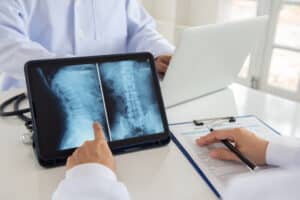
What Are The Symptoms of a Herniated Disc?
No matter what area of the spine becomes herniated, there are symptoms that can occur. The symptoms you can experience, however, depend on where the herniated disc is located. Some people can have herniated discs in the lower back while others can have one in their neck.
Below are all the potential symptoms of a herniated disc:
Arm Pain
Arm pain is usually the result of a herniated disc in the neck. It has been reported that the pain stems from the shoulder and arm, which can also shoot up when you strain. This can include coughing, sneezing, or being in a specific position. The pain experienced is described as either sharp or burning.
Leg Pain
Leg pain can occur when there is a herniated disc in the lower back. Most people with a herniated disc in the lower portions of the spinal cord experience pain in the buttocks, thigh, calf, and foot.
Numbness
A herniated disc can cause people to feel numbness in their extremities. This happens because the nerves affected by the herniated disc send signals to the brain. Numbness may wax and wane, or it may be constant in nature.
Slower Reflexes
Pain and loss of feeling are not the only symptoms a herniated disc can cause. Another symptom includes having slower reflexes. Due to the amount of pressure on the nerve, a herniated disc can cause your reflexes to be slower than usual.
Muscle Weakness
Muscle weakness occurs when the muscles attached to specific nerves weaken. This can cause you to lose balance and weaken your grip strength. If left untreated, muscle weakness can result in injury as well.
Schedule an Appointment With Texas Neurosurgery LLP
A herniated disc can be uncomfortable and even painful at times. It can also point to a much deeper neurological issue if left untreated. Contact us at 214-823-2052 to schedule an appointment to treat your herniated disc today.

